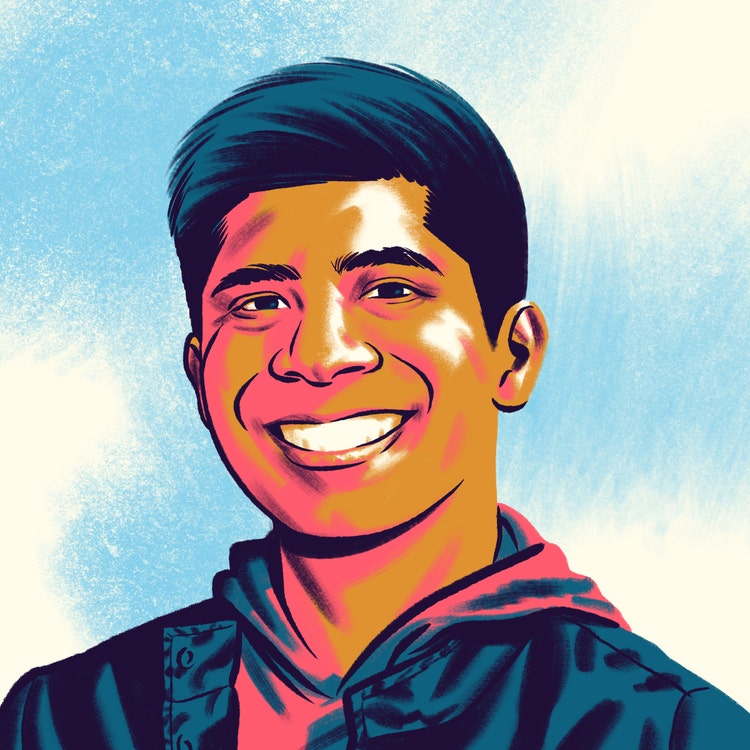Jeremy Joachim
Design Technologist, Machine Intelligence Design

Illustration by Michael Cho
How would you describe what you do to someone you’re sitting next to on a plane?
As technology gets smarter and more powerful, I explore how the experience of engaging with that technology looks and feels to humans. Specifically, that means designing the ways that artificial intelligence and machine learning can inspire and enable designers in our creative software. The most exciting part of that is giving someone—especially someone who wouldn’t call themselves “creative”—tools to express themselves and their own individuality.
What’s a design problem you want to solve?
I'm sure everyone, at one time or another, has felt that their perspective isn’t worth sharing, or that they’re not experienced enough to take a seat at the table. As an example, there are people who listen to music every day but would tell you they don’t know anything about music because they don’t know theory or can’t play an instrument. But before making, there’s taste, style, point of view—things we develop by taking in the world around us.
I don’t know whether it’s due to limited perception, or access, or intent, but I think it’s a problem that design has an ability, and thus a responsibility, to solve: To make people feel more entitled, allowed, and encouraged to participate and express themselves (whether by saying something, making something, doing something) in areas where they’d otherwise feel like they don’t have enough expertise. It's exactly where designing an experience, and the ways in which people engage with that experience, has the potential to empower and show people that they belong.
What has your career trajectory been? A straight shot? A maze of switchbacks? Or a knot you’ve untangled? Would you change the route?
A knot untangled is a great way to put it. I’ve spent considerable time doing things that aren’t called design. I started college on a pre-med track. I dropped that to study mechanical engineering and robotics and was surprised to absolutely love linear algebra and my classes in electronic music. I played too many video games (still do) and eventually took courses in design and interdisciplinary thought. They provided a way to make sense of all the unrelated things I did, and to see all the random decisions I made along the way as part of one continuous narrative, one single thread. I’ve since done my best to follow whatever feels the most interesting to me in the moment, trusting that so long as it makes sense to me, it’s consistent with my story.
What do you do when you’re struggling to focus?
By choice, I’m always multitasking, getting stimulus from five separate places at once. So, when it comes time to strap in and focus, I try to turn off those things that aren’t immediately relevant. That sometimes works, but when it doesn’t, I usually just give in and satisfy whatever distraction is holding my attention, following it to the end of its interest.
What was your dream job when you were ten?
If I think back to being a kid, I can remember all the jobs I never wanted to have. I didn’t want to be an astronaut or a firefighter or a president because they seemed like way too much responsibility (for the most part, I still feel the same), but I had no idea what I wanted to do. It made me super nervous and I often worried that I’d never figure out what I wanted to do with my life. I remember heading to college and thinking it was where I’d finally learn what I’m supposed to be doing. I didn’t, at least, not in the ways I thought I would.
What would you try if you knew you would not fail?
I’d second-guess myself less and speak up more. I’d do a better job of standing behind things that I’ve done without making excuses for them. Most of all though I think I’d be more comfortable admitting how much I care about things.
It’s scary to fail when you care about something, because you’ve committed time and energy and thought to it, and so it’s easier to just be like, “I just threw this together super quick, so it’s not that good.” I catch myself saying that and undermining myself way too often, and if I knew I wouldn’t fail, I think I wouldn’t feel so compelled to protect myself like that.
What’s your greatest extravagance and why?
I love tools and technology, so I end up collecting gadgets that I don’t need but that I think are cool mostly just because they exist, and someone thought to make them. Lots of computer peripherals, cooking utensils, toys for my dog. Also, pizza. I eat a ton of pizza.